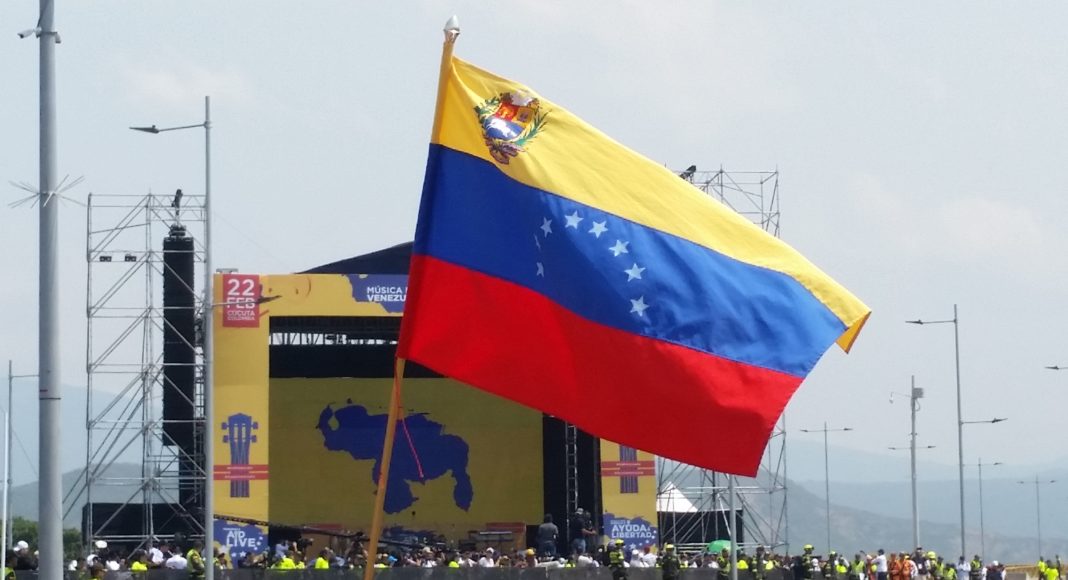Charles Beach, in Cúcuta, witnessed Branson’s concert and the halting of the aid convoy
On 22 January Richard Branson came to the Colombian border city of Cúcuta, a place that I’ve called my home and PhD field site for the last year, to organize a fundraising concert for the people of Venezuela. The British business magnate and creator of the Virgin empire, inspired by events like Concert for Bangladesh and Live Aid, aimed not only to raise money for humanitarian aid but to also bring world attention to a convoy of aid that was attempting to cross a border that has been shut to traffic since 2015.
I remember as a child following with excitement Branson’s attempted circumnavigation of the globe in a ‘Virgin’-branded balloon. Now, 21 years later, it seemed surreal watching him address a 200,000-strong Colombo-Veneuzelan crowd in a field, next to the brand-new but abandoned Tienditas Bridge that spans the border to Venezuela.
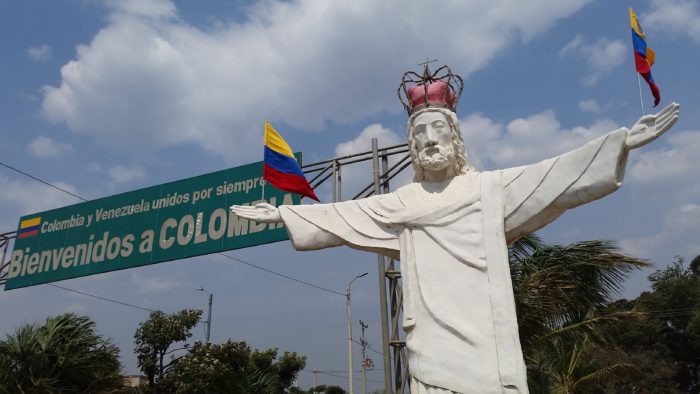
A cynic might say Branson, who’s not had much media attention for some while despite occasionally chiming-in on the Brexit debate in the UK or the death of a Virgin Galactic test pilot, took this opportunity to boost awareness in a region not familiar with the Virgin brand: ‘Phone home free to your nearest and dearest in Venezuela… with Virgin mobile!’, read a poster at the entry to the concert site. Branson was received warmly by the local crowd. Cucuteños enjoyed the business that such a high-profile event brought to their economically struggling city. While migrant Venezuelans, the majority of the audience, were grateful to have their plight forced to the centre of the world stage.
The concert itself had a bitter-sweet mood, with artists from various Latin American countries performing: the Colombian, Carlos Vives; Luis Fonsi, a Puerto Rican of Despacito fame; and Venezuelan Ricardo Montaner, a vocal critic of the Maduro regime. Things took an evangelical turn with Mexican ‘Christian Motivator’ Daniel Habit who gave a rousing preacher-style speech to swelling music, causing many Venezuelans around me to start crying. The concert ended with a rendition of John Lennon’s Imagine.
Slowly filing out into the night to look for a bus back into the city center we passed a field of volunteers camping out overnight planning to cross the now completely closed border in the morning. Rousing speeches were being given about the imminent fall of Nicolás Maduro, whose presidency of Venezuela is now contested: Venezuela has a new pretender to the presidency in Juan Guaidó, who claims power under certain clauses of the constitution, and who attended the concert accompanied by Colombian President Iván Duque.
Coalitions and talk of war
Guaidó has taken the world by surprise in managing, at least for the moment, to unite the notoriously fractious Venezuelan opposition with his claim to the presidency under articles 232 and 233, and simultaneously to be anointed by an impressive number of foreign governments . He has received wide and vocal international support from the US, and the Lima group (Argentina, Brazil, Canada, Chile, Colombia, Costa Rica, Guatemala, Honduras, Mexico, Panama, Paraguay and Peru and several Caribbean states). The International Contact Group (Uruguay, Ecuador, Costa Rica, and 8 EU countries) takes a more conciliatory stance, urging free elections as the only way to resolve the situation. Yet none of these actors are mediators between a government and its opposition, as were the Dominican Republic and the Vatican at an earlier stage..
The most hawkish element in these international coalitions is the US, As evidenced by Marco Rubio tweeting the bloody face of Gaddafi, the widely promoted hashtag #IntervencionMilitarYA, and thenone too veiled threat in Trump’s repeated insistence that ‘all options are on the table’.
In this context the humanitarian aid convoy was an attempt to pose a challenge to sovereignty and possibly provoke Venezuela into attacking the apparently peaceful delivery of aid, the sight of which could encourage Venezuelan military defections which would be condoned under Guaidó’s amnesty[1].
With all this war-talk in the air, the mood in Cúcuta was tense. The morning after the concert I take the bus to the border again, this time to Simón Bolívar Bridge. There is a tenseness, a cliched but accurate ‘calm before the storm’. My bus is stopped by a transit-police check point and I am forced to walk the last mile through La Parada, the commercial district leading to by the bridge.
A place that is normally overwhelmingly busy with contraband street-traders, currency exchange shops, and pharmacies, La Parada stands empty with just a few soldiers on patrol and volunteers in blue vests heading to the border to help with the attempt to cross the border. Everybody covers their eyes as a police helicopter skims low across the rooftops, whipping up dust from the empty streets. By the entrance to the bridge, where there are normally queues of Venezuelans waiting to re-enter their country, there is an organization point for the blue-jacketed volunteers and the police guard the entry to the bridge.
Around an hour or so later the volunteers set off to march across the bridge in a movement coordinated with volunteers at different points along the Venezuelan border. They are met with Venezuelan national guardsmen, who have formed along the border line in tight ranks with riot shields and after some time tear gas is fired at the protesters.
The fighting at the bridge
The events that unfold after that are what made international news. Supply trucks were set on fire, national guard members defected to Colombia, protesters were shot at and Maduro cut diplomatic ties with Colombia. Fighting broke out in Venezuelan border towns. Guaidó observed proceedingss from a make shift ‘presidential’ office on Tienditas Bridge and saluted the defected Soldiers as they swore allegiance to their new president. Many people were seriously injured and on the Brazilian border there were three deaths.
Like many other residents of Cúcuta, I had foreseen violence and didn’t join the volunteers in their march across the bridge. The Venezuelan National Guard (GNB) have a terrible human rights record, are violently repressive and known to shoot across the border at supposed Colombian smuggling gangs, even though the National Guard themselves are known to run the smuggling on the Venezuelan side. Anyone like myself who reads La Opinion, the local newspaper, will be aware of the slew of fatalities and shootouts relating to smuggling over the past few years, all with probable culpability laid upon the GNB[i] [ii] [iii] [iv].
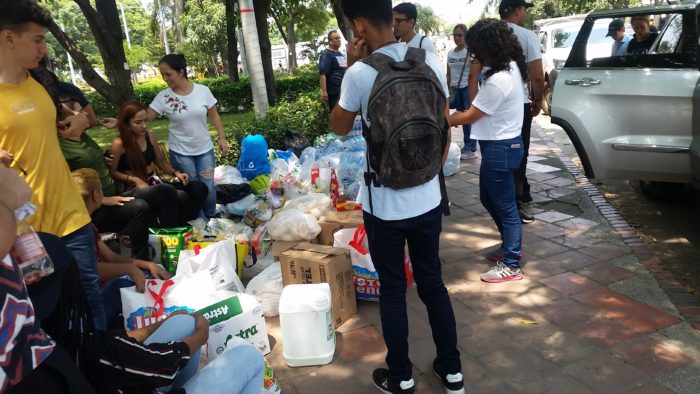
There’s really no way the Colombian authorities could have failed to anticipate this violent outcome of the caravan and voices in the Colombian media are beginning to claim that the volunteers were used as cannon fodder for a larger international relations game.
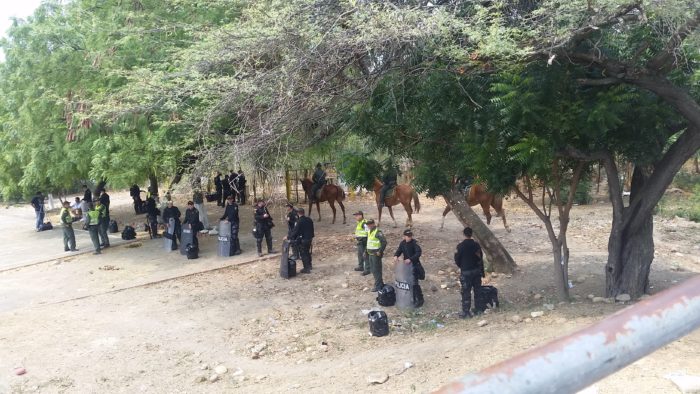
Rice and vinegar
The day after the initial conflict there is a call-out on social media and I head to a park a block from my house where young enthusiastic Venezuelans are collecting aid to take to one of the bridges. A sign in cute bubble writing says ‘Ayuda Humanitaria, Humanitarian Aid’. This aid seems to mainly consist of water, rice and vinegar. They tell me its headed for the Francisco de Paula Santander bridge so I walk out of the city to the border crossing. This time I am greeted by an international media encampment of Brazilian, Mexican, Argentinian and British journalists. They are still wearing Branson’s ‘Aid Live’ press badges as if this is some sort of after-party. A line of Colombian riot police runs parallel to the river/border and allows only protesters to walk to the middle of the bridge from where shouting can be heard. There is a waft of tear gas in the air and strewn along the side of the bridge are weary looking Venezuelans dressed in dirty clothes, croc sandals and with gas masks dangling round their necks. These aren’t the young enthusiastic aid collectors, nor well-educated, media-savvy, blue-vesters. These are working class Venezuelans well-schooled in urban conflict and with not much to lose.
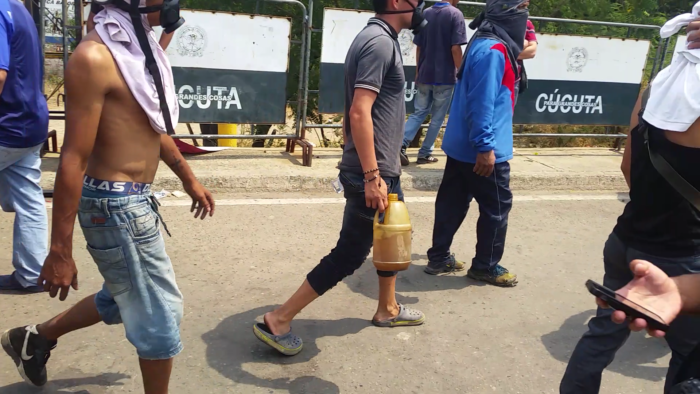
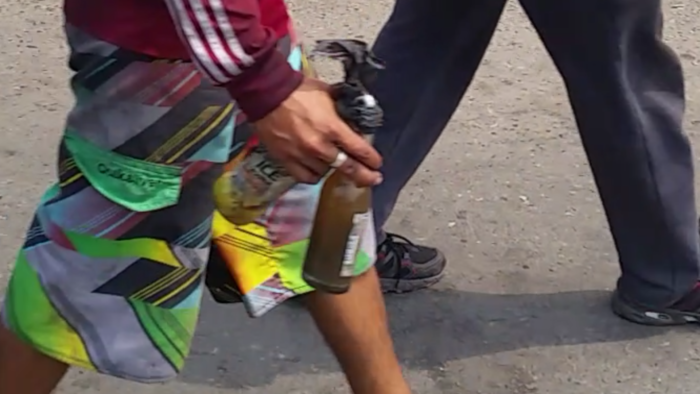
This is who the aid in the park was destined for, rehydration for the ‘troops’ and vinegar to lessen the effects of tear gas. A wave of protesters staggers off the bridge to soft applause, carrying Molotov cocktails and flasks of petrol. A Mexican journalist tries to fist-bump them and is completely ignored. They’re also not keen to interact with me but a few speak up and mention that Maduro is releasing prison inmates to back-up the GNP. They’re cautious about talking, with good reason, as anyone could be taking photos for the Maduro regime and they could end up being incarcerated themselves. So many times I’ve been told that in Venezuela the GNP would suspect me of being an American spy but I never thought I’d be suspected of being a spook for the GNP. I watch on as Colombian police casually stand back and let Venezuelan protesters pass on by with molotovs in hand.
Border politics
The Colombian Red Cross have chosen not to get involved due to politicization and lack of neutrality, as the delivery of aid descended into pitched battles between the GNP and battle-hardened protesters with a vague aim of reopening the border. There has been concern over the last few months about how armed conflict between Colombia and Venezuela could result in a proxy war between Russia and the US. However, what happened today, in miniature, was a proxy battle between Colombia and Venezuela played out on the bridges between the two countries, where angry Venezuelan protesters with nothing to lose are allowed by Colombian police to attack the Venezuelan security forces in a controlled and ordered manner as food and water continue to be supplied by concerned folk in Cúcuta.
Meanwhile along the border the illegal crossing routes have seen an increase in usage, boosting the power of the Colombian paramilitaries who control them.
Cúcuta is a staunchly right-wing city and voted in majority for Iván Duque. However people here are starting to be more critical of his foreign policy, ‘They could have just funded the Red Cross who are already active in Caracas, it didn’t have to be such a big show resulting in a border closure,’ one candidate in the upcoming mayoral elections told me, ‘the closure affects us economically, we rely on trade from Venezuelans who come here to buy things[…] I support president Duque but I don’t like how this government is treating the border region.’
Duque visited Cúcuta several times during his election campaign, but people here are beginning to wonder if the visits weren’t more to do with posturing against Maduro rather than supporting this loyalist but economically deprived region of Colombia. The fortunes of Cúcuta have always been tied up with those of Venezuela. The desire for stability in the neighbouring country is reflected in the Mayor of Cúcuta’s public criticism of government policy, and the concerns of local economic crisis from the president of the chamber of commerce.
Cúcuta has taken the brunt of the Venezuelan migration crisis and almost the majority of Venezuelans here, from baggers on the street to business owners, want to see the fall of Maduro. Despite the extreme discomfort I feel with what has been described as an American-backed coup d’état, one can’t excuse the human rights abuses of Maduro reported extensively by Amnesty International and Human Rights Watch. My desire to see an end to forced disappearances, a corrupted justice system and indefinite detainment and torture outweighs the scepticism about US motives I may share with Maduro’s remaining international supporters or neutral parties. Any opposition to Maduro that forms will have American Influence whether it is wanted or not. All the more reason to have a strong voice for negotiated resolution to be present amongst the opposition coalition.
I just hope that Guaidó and his Colombian allies take into consideration the potential effects of military intervention or civil war and that the positively dangerous US/Venezuelan hawks take a back seat with their claims of a ‘quick and surgical’ intervention. These international posturings have been difficult for the Colombia-Venezuelan border region and any more firm-handed action would be positively disastrous.
As of now there have been few military defections and Guaidó has returned to Venezuela where he hopes to keep up the momentum that so many of his opposition predecessors have lost. As for Richard Branson, did he understand the nuance of this situation when he was asked to be a benefactor? The attempted delivery of aid led to deaths, and a dangerous destabilisation of the border. I’d like to think at best Branson was naively philanthropic and at worst cynically self-promotional. I welcome cultural events in the region and now, after giving Cúcuta its 15 minutes of international fame, maybe Branson could come back and do an ‘Aid Live’ for the struggling Cúcuta and it’s 300,000 thousand Venzuelan residents?
LAB adds: top U.S. officials have said Nicolás Maduro’s regime burned an aid convoy at the Cúcuta bridge. A recent article in the New York Times examines unpublished footage and previously released tapes — including footage released by the Colombian government, which has blamed Mr. Maduro for the fire —which allowed for a reconstruction of the incident. It suggests that a Molotov cocktail thrown by an antigovernment protester was the most likely trigger for the blaze. The paper also looks at subsequent reporting of the incident which universally blames Maduro.
Photos: Charles Beach
Charles Beach completed
his MRes dissertation at UCL, London, and is embarked on a PhD. He has a year
in the Colombo-Venezuelan border town of Cúcuta. In November 2017 he wrote an
article for LAB on petrol-smuggling at the border.
[1] Critics argue that encouraging defections only
increases the chances of civil war between two military factions. It’s also
been pointed out that Guiadó’s promised amnesty is arguably invalid under article 29 of the Venezuelan Constitution,
which prohibits any amnesty for violators of human rights.
[i] https://www.laopinion.com.co/judicial/dos-muertos-y-dos-heridos-en-la-frontera-104016#OP
[ii] https://noticias.caracoltv.com/colombia/panico-en-la-frontera-supuestos-miembros-de-guardia-venezolana-dispararon-contra-migrantes-ilegales
[iii] https://www.laopinion.com.co/frontera/manos-de-un-militar-fallece-hombre-en-una-trocha-de-urena-102108#OP
[iv] https://www.laopinion.com.co/judicial/cruzando-el-rio-tachira-un-hombre-encontro-la-muerte-103271#OP

